Gurjara-Pratihara dynasty
The Gurjara-Pratihara dynasty was an imperial power during the Late Classical period on the Indian subcontinent, that ruled much of Northern India from the mid-8th to the 11th century. They ruled first at Ujjain and later at Kannauj.[1]
Gurjara Pratihara dynasty | |||||||||||||||||||||
|---|---|---|---|---|---|---|---|---|---|---|---|---|---|---|---|---|---|---|---|---|---|
| mid-8th century CE–1036 CE | |||||||||||||||||||||
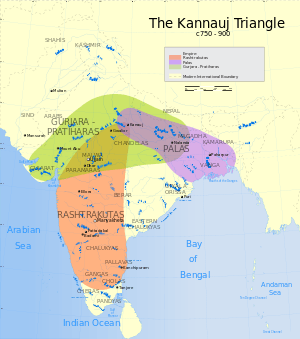 Extent of the Pratihara Empire shown in green | |||||||||||||||||||||
| Capital | Kannauj | ||||||||||||||||||||
| Common languages | Sanskrit, Prakrit | ||||||||||||||||||||
| Religion | Hinduism | ||||||||||||||||||||
| Government | Monarchy | ||||||||||||||||||||
| Historical era | Late Classical India | ||||||||||||||||||||
• Established | mid-8th century CE | ||||||||||||||||||||
| 1008 CE | |||||||||||||||||||||
• Disestablished | 1036 CE | ||||||||||||||||||||
| |||||||||||||||||||||
| Today part of | India | ||||||||||||||||||||
Part of a series on the |
|---|
| History of India |
Satavahana gateway at Sanchi, 1st century CE |
|
Ancient
|
|
Classical
|
|
|
|
Early modern
|
|
Modern
|
|
Related articles
|
The Gurjara-Pratiharas were instrumental in containing Arab armies moving east of the Indus River.[2] Nagabhata I defeated the Arab army under Junaid and Tamin during the Caliphate campaigns in India. Under Nagabhata II, the Gurjara-Pratiharas became the most powerful dynasty in northern India. He was succeeded by his son Ramabhadra, who ruled briefly before being succeeded by his son, Mihira Bhoja. Under Bhoja and his successor Mahendrapala I, the Pratihara Empire reached its peak of prosperity and power. By the time of Mahendrapala, the extent of its territory rivalled that of the Gupta Empire stretching from the border of Sindh in the west to Bengal in the east and from the Himalayas in the north to areas past the Narmada in the south.[3][4] The expansion triggered a tripartite power struggle with the Rashtrakuta and Pala empires for control of the Indian Subcontinent. During this period, Imperial Pratihara took the title of Maharajadhiraja of Āryāvarta (Great King of Kings of India).
Gurjara-Pratihara are known for their sculptures, carved panels and open pavilion style temples. The greatest development of their style of temple building was at Khajuraho, now a UNESCO World Heritage Site.[5]
The power of the Pratiharas was weakened by dynastic strife. It was further diminished as a result of a great raid led by the Rashtrakuta ruler Indra III who, in about 916, sacked Kannauj. Under a succession of rather obscure rulers, the Pratiharas never regained their former influence. Their feudatories became more and more powerful, one by one throwing off their allegiance until, by the end of the 10th century, the Pratiharas controlled little more than the Gangetic Doab. Their last important king, Rajyapala, was driven from Kannauj by Mahmud of Ghazni in 1018.[4]
Etymology and origin
_from_Nilgund_of_Rashtrakuta_King_Amoghavarsha_I.jpg)
The origin of the dynasty and the meaning of the term "Gurjara" in its name is a topic of debate among historians. The rulers of this dynasty used the self-designation "Pratihara" for their clan, and never referred to themselves as Gurjaras.[6] They claimed descent from the legendary hero Lakshmana, who is said to have acted as a pratihara ("door-keeper") for his brother Rama.[7][8] Some modern scholars theorize that a Pratihara ancestor served as a "minister of defense" (or Pratihara) in a Rasthrakuta court, and that is how the dynasty came to be known as Pratihara.[9]
Govind Sadashiv Ghurye describe them Brahmins[10]
Multiple inscriptions of their neighbouring dynasties describe the Pratiharas as "Gurjara".[11] The term "Gurjara-Pratihara" occurs only in the Rajor inscription of a feudatory ruler named Mathanadeva, who describes himself as a "Gurjara-Pratihara". According to one school of thought, Gurjara was the name of the territory (see Gurjara-desha) originally ruled by the Pratiharas; gradually, the term came to denote the people of this territory. An opposing theory is that Gurjara was the name of the tribe to which the dynasty belonged, and Pratihara was a clan of this tribe.[12]
Among those who believe that the term Gurjara was originally a tribal designation, there are disagreements over whether they were native Indians or foreigners.[13] The proponents of the foreign origin theory point out that the Gurjara-Pratiharas suddenly emerged as a political power in north India around 6th century CE, shortly after the Huna invasion of that region.[14] Critics of the foreign origin theory argue that there is no conclusive evidence of their foreign origin: they were well-assimilated in the Indian culture. Moreover, if they invaded Indian through the north-west, it is inexplicable why would they choose to settle in the semi-arid area of present-day Rajasthan, rather than the fertile Indo-Gangetic Plain.[15]
According to the Agnivansha legend given in the later manuscripts of Prithviraj Raso, the Pratiharas and three other Rajput dynasties originated from a sacrificial fire-pit (agnikunda) at Mount Abu. Some colonial-era historians interpreted this myth to suggest a foreign origin for these dynasties. According to this theory, the foreigners were admitted in the Hindu caste system after performing a fire ritual.[16] However, this legend is not found in the earliest available copies of Prithviraj Raso. It is based on a Paramara legend; the 16th century Rajput bards claim heroic descent of clans in order to foster Rajput unity against the Mughals.[17]
History
The original centre of Pratihara power is a matter of controversy. R. C. Majumdar, on the basis of a verse in the Harivamsha-Purana, AD 783, the interpretation of which he conceded was not free from difficulty, held that Vatsaraja ruled at Ujjain .[18] Dasharatha Sharma, interpreting it differently located the original capital in the Bhinmala Jalor area.[19] M. W. Meister[20] and Shanta Rani Sharma[21] concur with his conclusion in view of the fact that the writer of the Jaina narrative Kuvalayamala states that it was composed at Jalor in the time of Vatsaraja in AD 778, which is five years before the composition of Harivamsha-Purana.
Early rulers
Nagabhata I (730–756) extended his control east and south from Mandor, conquering Malwa as far as Gwalior and the port of Bharuch in Gujarat. He established his capital at Avanti in Malwa, and checked the expansion of the Arabs, who had established themselves in Sind. In this battle (738 CE) Nagabhata led a confederacy of Gurjara-Pratiharas to defeat the Muslim Arabs who had till then been pressing on victorious through West Asia and Iran. Nagabhata I was followed by two weak successors, who were in turn succeeded by Vatsraja (775–805).
Resistance to the Caliphate
In the Gwalior inscription, it is recorded that Gurjara-Pratihara emperor Nagabhata "crushed the large army of the powerful Mlechcha king." This large army consisted of cavalry, infantry, siege artillery, and probably a force of camels. Since Tamin was a new governor he had a force of Syrian cavalry from Damascus, local Arab contingents, converted Hindus of Sindh, and foreign mercenaries like the Turkics. All together the invading army may have had anywhere between 10–15,000 cavalry, 5000 infantry, and 2000 camels.
The Arab chronicler Sulaiman describes the army of the Pratiharas as it stood in 851 CE, "The ruler of Gurjars maintains numerous forces and no other Indian prince has so fine a cavalry. He is unfriendly to the Arabs, still he acknowledges that the king of the Arabs is the greatest of rulers. Among the princes of India there is no greater foe of the Islamic faith than he. He has got riches, and his camels and horses are numerous."[22]
Conquest of Kannauj and further expansion
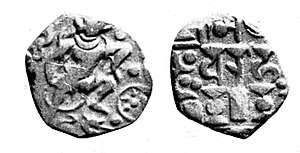
The metropolis of Kannauj had suffered a power vacuum following the death of Harsha without an heir, which resulted in the disintegration of the Empire of Harsha. This space was eventually filled by Yashovarman around a century later but his position was dependent upon an alliance with Lalitaditya Muktapida. When Muktapida undermined Yashovarman, a tri-partite struggle for control of the city developed, involving the Pratiharas, whose territory was at that time to the west and north, the Palas of Bengal in the east and the Rashtrakutas, whose base lay at the south in the Deccan.[25][26] Vatsraja successfully challenged and defeated the Pala ruler Dharmapala and Dantidurga, the Rashtrakuta king, for control of Kannauj.
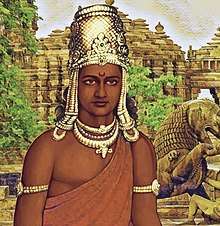
Around 786, the Rashtrakuta ruler Dhruva (c. 780–793) crossed the Narmada River into Malwa, and from there tried to capture Kannauj. Vatsraja was defeated by the Dhruva Dharavarsha of the Rashtrakuta dynasty around 800. Vatsraja was succeeded by Nagabhata II (805–833), who was initially defeated by the Rashtrakuta ruler Govinda III (793–814), but later recovered Malwa from the Rashtrakutas, conquered Kannauj and the Indo-Gangetic Plain as far as Bihar from the Palas, and again checked the Muslims in the west. He rebuilt the great Shiva temple at Somnath in Gujarat, which had been demolished in an Arab raid from Sindh. Kannauj became the center of the Gurjara-Pratihara state, which covered much of northern India during the peak of their power, c. 836–910.
Rambhadra (833-c. 836) briefly succeeded Nagabhata II. Mihira Bhoja (c. 836–886) expanded the Pratihara dominions west to the border of Sind, east to Bengal, and south to the Narmada. His son, Mahenderpal I (890–910), expanded further eastwards in Magadha, Bengal, and Assam.
Decline
Bhoja II (910–912) was overthrown by Mahipala I (912–944). Several feudatories of the empire took advantage of the temporary weakness of the Gurjara-Pratiharas to declare their independence, notably the Paramaras of Malwa, the Chandelas of Bundelkhand, the Kalachuris of Mahakoshal, the Tomaras of Haryana, and the Chahamanas of Shakambhari. The south Indian Emperor Indra III (c. 914–928) of the Rashtrakuta dynasty briefly captured Kannauj in 916, and although the Pratiharas regained the city, their position continued to weaken in the 10th century, partly as a result of the drain of simultaneously fighting off Turkic attacks from the west, the attacks from the Rashtrakuta dynasty from the south and the Pala advances in the east. The Gurjara-Pratiharas lost control of Rajasthan to their feudatories, and the Chandelas captured the strategic fortress of Gwalior in central India around 950. By the end of the 10th century the Gurjara-Pratihara domains had dwindled to a small state centered on Kannauj.
Mahmud of Ghazni captured Kannauj in 1018, and the Pratihara ruler Rajapala fled. He was subsequently captured and killed by the Chandela ruler Vidyadhara.[27][28] The Chandela ruler then placed Rajapala's son Trilochanpala on the throne as a proxy. Jasapala, the last Gurjara-Pratihara ruler of Kannauj, died in 1036.
Gurjara-Pratihara art
.jpg) One of the four entrances of the Teli ka Mandir. This Hindu temple was built by the Pratihara emperor Mihira Bhoja.[29]
One of the four entrances of the Teli ka Mandir. This Hindu temple was built by the Pratihara emperor Mihira Bhoja.[29]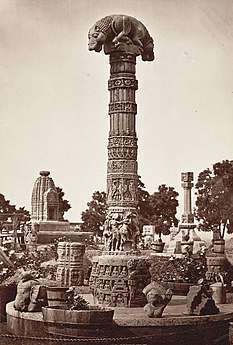 Sculptures near Teli ka Mandir, Gwalior Fort.
Sculptures near Teli ka Mandir, Gwalior Fort.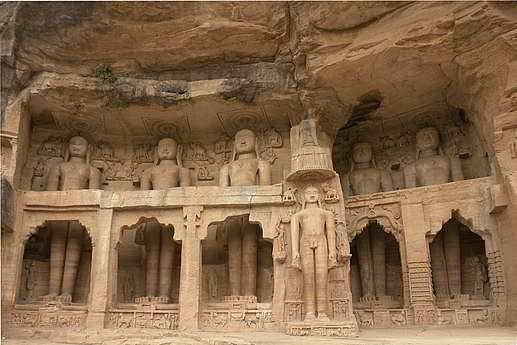 Jainism-related cave monuments and statues carved into the rock face inside Siddhachal Caves, Gwalior Fort.
Jainism-related cave monuments and statues carved into the rock face inside Siddhachal Caves, Gwalior Fort.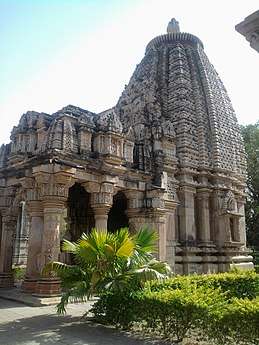 Ghateshwara Mahadeva temple at Baroli Temples complex. The complex of eight temples, built by the Gurjara-Pratiharas, is situated within a walled enclosure.
Ghateshwara Mahadeva temple at Baroli Temples complex. The complex of eight temples, built by the Gurjara-Pratiharas, is situated within a walled enclosure.
There are notable examples of architecture from the Gurjara-Pratihara era, including sculptures and carved panels.[30] Their temples, constructed in an open pavilion style. One of the most notable Gurjara-Pratihara style of architecture was Khajuraho, built by their vassals, the Chandelas of Bundelkhand.[5]
Māru-Gurjara architecture
Māru-Gurjara architecture was developed during Gurjara Pratihara Empire.
Bateshwar Hindu temples complex
Bateshwar Hindu temples, Madhya Pradesh was constructed during the Gurjara-Pratihara Empire between 8th to 11th century.[31]
Baroli temples complex
Baroli temples complex are eight temples, built by the Gurjara-Pratiharas, is situated within a walled enclosure.
Legacy
Historians of India, since the days of Elphinstone, have wondered at the slow progress of Muslim invaders in India, as compared with their rapid advance in other parts of the world. The Arabs possibly only stationed small invasions independent of the Caliph. Arguments of doubtful validity have often been put forward to explain this unique phenomenon. Currently it is believed that it was the power of the Gurjara-Pratihara army that effectively barred the progress of the Muslims beyond the confines of Sindh, their first conquest for nearly three hundred years. In the light of later events this might be regarded as the "Chief contribution of the Gurjara Pratiharas to the history of India".[22]
List of rulers
- Nagabhata I (730–760)
- Kakustha and Devaraja (760–780)
- Vatsaraja (780–800)
- Nagabhata II (800–833)
- Ramabhadra (833–836)
- Mihira Bhoja or Bhoja I (836–885)
- Mahendrapala I (885–910)
- Bhoja II (910–913)
- Mahipala I (913–944)
- Mahendrapala II (944–948)
- Devapala (948–954)
- Vinayakapala (954–955)
- Mahipala II (955–956)
- Vijayapala II (956–960)
- Rajapala (960–1018)
- Trilochanapala (1018–1027)
- Yasahpala (1024–1036)
References
- Avari 2007, pp. 204–205: Madhyadesha became the ambition of two particular clans among a tribal people in Rajasthan, known as Gurjara and Pratihara. They were both part of a larger federation of tribes, some of which later came to be known as the Rajputs
- Wink, André (2002). Al-Hind: Early Medieval India and the Expansion of Islam, 7th–11th Centuries. Leiden: BRILL. p. 284. ISBN 978-0-391-04173-8.
- Avari 2007, p. 303.
- Sircar 1971, p. 146.
- Partha Mitter, Indian art, Oxford University Press, 2001 pp.66
- Sanjay Sharma 2006, p. 188.
- Tripathi 1959, p. 223.
- Puri 1957, p. 7.
- Agnihotri, V. K. (2010). Indian History. 26. p. B8.
Modern historians believed that the name was derived from one of the kings of the line holding the office of Pratihara in the Rashtrakuta court
- Ghurye, Govind Sadashiv (1966). Indian Costume. Popular Prakashan. ISBN 978-81-7154-403-5.
- Puri 1957, p. 9-13.
- Majumdar 1981, pp. 612-613.
- Puri 1957, p. 1-2.
- Puri 1957, p. 2.
- Puri 1957, pp. 4-6.
- Yadava 1982, p. 35.
- Singh 1964, pp. 17-18.
- Majumdar, R.C. (1955). The Age of Imperial Kanauj (First ed.). Bombay: Bharatiya Vidya Bhavan. pp. 21–22.
- Sharma, Dasharatha (1966). Rajasthan through the Ages. Bikaner: Rajasthan State Archives. pp. 124–30.
- Meister, M.W (1991). Encyclopaedia of Indian Temple Architecture, Vol. 2, pt.2, North India: Period of Early Maturity, c. AD 700-900 (first ed.). Delhi: American Institute of Indian Studies. p. 153. ISBN 0195629213.
- Sharma, Shanta Rani (2017). Origin and Rise of the Imperial Pratihāras of Rajasthan: Transitions, Trajectories and Historical Chang (First ed.). Jaipur: University of Rajasthan. pp. 77–78. ISBN 978-93-85593-18-5.
- Chaurasia, Radhey Shyam (2002). History of Ancient India: Earliest Times to 1000 A. D. Atlantic Publishers & Distributors. p. 207. ISBN 978-81-269-0027-5.
- Smith, Vincent Arthur; Edwardes, S. M. (Stephen Meredyth) (1924). The early history of India : from 600 B.C. to the Muhammadan conquest, including the invasion of Alexander the Great. Oxford : Clarendon Press. p. Plate 2.
- Ray, Himanshu Prabha (2019). Negotiating Cultural Identity: Landscapes in Early Medieval South Asian History. Taylor & Francis. p. 164. ISBN 9781000227932.
- Chopra, Pran Nath (2003). A Comprehensive History of Ancient India. Sterling Publishers. pp. 194–195. ISBN 978-81-207-2503-4.
- Kulke, Hermann; Rothermund, Dietmar (2004) [1986]. A History of India (4th ed.). Routledge. p. 114. ISBN 978-0-415-32920-0.
- Dikshit, R. K. (1976). The Candellas of Jejākabhukti. Abhinav. p. 72. ISBN 9788170170464.
- Mitra, Sisirkumar (1977). The Early Rulers of Khajurāho. Motilal Banarsidass. pp. 72–73. ISBN 9788120819979.
- K. D. Bajpai (2006). History of Gopāchala. Bharatiya Jnanpith. p. 31. ISBN 978-81-263-1155-2.
- Kala, Jayantika (1988). Epic scenes in Indian plastic art. Abhinav Publications. p. 5. ISBN 978-81-7017-228-4.
- "ASI to resume restoration of Bateshwar temple complex in Chambal". Hindustan Times. 21 May 2018.
Bibliography
| Wikimedia Commons has media related to Gurjara-Pratihara. |
| Wikiquote has quotations related to: Gurjara-Pratihara dynasty |
- Avari, Burjor (2007). India: The Ancient Past. A History of the Indian-Subcontinent from 7000 BC to AD 1200. New York: Routledge. ISBN 978-0-203-08850-0.CS1 maint: ref=harv (link)
- Sircar, Dineschandra (1971). Studies in the Geography of Ancient and Medieval India. Motilal Banarsidass. ISBN 9788120806900.CS1 maint: ref=harv (link)
- Ganguly, D. C. (1935), Narendra Nath Law (ed.), "Origin of the Pratihara Dynasty", The Indian Historical Quarterly, Caxton, XI: 167–168CS1 maint: ref=harv (link)
- Majumdar, R. C. (1981), "The Gurjara-Pratiharas", in R. S. Sharma and K. K. Dasgupta (ed.), A Comprehensive history of India: A.D. 985-1206, 3 (Part 1), Indian History Congress / People's Publishing House, ISBN 978-81-7007-121-1CS1 maint: ref=harv (link)
- Majumdar, R.C. (1955). The Age of Imperial Kanauj (First ed.). Bombay: Bharatiya Vidya Bhavan.
- Mishra, V. B. (1954), "Who were the Gurjara-Pratīhāras?", Annals of the Bhandarkar Oriental Research Institute, 35 (¼): 42–53, JSTOR 41784918CS1 maint: ref=harv (link)
- Meister, M.W (1991). Encyclopaedia of Indian Temple Architecture, Vol. 2, pt.2, North India: Period of Early Maturity, c. AD 700-900 (first ed.). Delhi: American Institute of Indian Studies. p. 153. ISBN 0195629213
- Puri, Baij Nath (1957), The history of the Gurjara-Pratihāras, Munshiram ManoharlalCS1 maint: ref=harv (link)
- Puri, Baij Nath (1986) [first published 1957], The History of the Gurjara-Pratiharas, Delhi: Munshiram Manoharlal
- Sharma, Dasharatha (1966). Rajasthan through the Ages. Bikaner: Rajasthan State Archives
- Sharma, Sanjay (2006), "Negotiating Identity and Status Legitimation and Patronage under the Gurjara-Pratīhāras of Kanauj", Studies in History, 22 (22): 181–220, doi:10.1177/025764300602200202
- Sharma, Shanta Rani (2012), "Exploding the Myth of the Gūjara Identity of the Imperial Pratihāras", Indian Historical Review, 39 (1): 1–10, doi:10.1177/0376983612449525
- Singh, R. B. (1964), History of the Chāhamānas, N. KishoreCS1 maint: ref=harv (link)
- Sharma, Shanta Rani (2017). Origin and Rise of the Imperial Pratihāras of Rajasthan: Transitions, Trajectories and Historical Change (First ed.). Jaipur: University of Rajasthan. p. 77-78. ISBN 978-93-85593-18-5.
- Tripathi, Rama Shankar (1959). History of Kanauj: To the Moslem Conquest. Motilal Banarsidass. ISBN 978-81-208-0478-4.CS1 maint: ref=harv (link)
- Yadava, Ganga Prasad (1982), Dhanapāla and His Times: A Socio-cultural Study Based Upon His Works, ConceptCS1 maint: ref=harv (link)
| Timeline and cultural period |
Northwestern India (Punjab-Sapta Sindhu) |
Indo-Gangetic Plain | Central India | Southern India | ||
| Upper Gangetic Plain (Ganga-Yamuna doab) |
Middle Gangetic Plain | Lower Gangetic Plain | ||||
| IRON AGE | ||||||
| Culture | Late Vedic Period | Late Vedic Period (Srauta culture)[lower-alpha 1] Painted Grey Ware culture |
Late Vedic Period (Shramanic culture)[lower-alpha 2] Northern Black Polished Ware |
Pre-history | ||
| 6th century BC | Gandhara | Kuru-Panchala | Magadha | Adivasi (tribes) | ||
| Culture | Persian-Greek influences | "Second Urbanisation" Rise of Shramana movements Jainism - Buddhism - Ājīvika - Yoga |
Pre-history | |||
| 5th century BC | (Persian conquests) | Shaishunaga dynasty | Adivasi (tribes) | |||
| 4th century BC | (Greek conquests) | Nanda empire | ||||
| HISTORICAL AGE | ||||||
| Culture | Spread of Buddhism | Pre-history | Sangam period (300 BC – 200 AD) | |||
| 3rd century BC | Maurya Empire | Early Cholas Early Pandyan Kingdom Satavahana dynasty Cheras 46 other small kingdoms in Ancient Thamizhagam | ||||
| Culture | Preclassical Hinduism[lower-alpha 3] - "Hindu Synthesis"[lower-alpha 4] (ca. 200 BC - 300 AD)[lower-alpha 5][lower-alpha 6] Epics - Puranas - Ramayana - Mahabharata - Bhagavad Gita - Brahma Sutras - Smarta Tradition Mahayana Buddhism |
Sangam period (continued) (300 BC – 200 AD) | ||||
| 2nd century BC | Indo-Greek Kingdom | Shunga Empire Maha-Meghavahana Dynasty |
Early Cholas Early Pandyan Kingdom Satavahana dynasty Cheras 46 other small kingdoms in Ancient Thamizhagam | |||
| 1st century BC | ||||||
| 1st century AD | Kuninda Kingdom | |||||
| 2nd century | Kushan Empire | |||||
| 3rd century | Kushano-Sasanian Kingdom | Kushan Empire | Western Satraps | Kamarupa kingdom | Kalabhra dynasty Pandyan Kingdom (Under Kalabhras) | |
| Culture | "Golden Age of Hinduism"(ca. AD 320-650)[lower-alpha 7] Puranas Co-existence of Hinduism and Buddhism | |||||
| 4th century | Kidarites | Gupta Empire Varman dynasty |
Kalabhra dynasty Pandyan Kingdom (Under Kalabhras) Kadamba Dynasty Western Ganga Dynasty | |||
| 5th century | Hephthalite Empire | Alchon Huns | Kalabhra dynasty Pandyan Kingdom (Under Kalabhras) Vishnukundina | |||
| 6th century | Nezak Huns Kabul Shahi |
Maitraka | Adivasi (tribes) | Badami Chalukyas Kalabhra dynasty Pandyan Kingdom (Under Kalabhras) | ||
| Culture | Late-Classical Hinduism (ca. AD 650-1100)[lower-alpha 8] Advaita Vedanta - Tantra Decline of Buddhism in India | |||||
| 7th century | Indo-Sassanids | Vakataka dynasty Empire of Harsha |
Mlechchha dynasty | Adivasi (tribes) | Pandyan Kingdom (Under Kalabhras) Pandyan Kingdom(Revival) Pallava | |
| 8th century | Kabul Shahi | Pala Empire | Pandyan Kingdom Kalachuri | |||
| 9th century | Gurjara-Pratihara | Rashtrakuta dynasty Pandyan Kingdom Medieval Cholas Pandyan Kingdom (Under Cholas) Chera Perumals of Makkotai | ||||
| 10th century | Ghaznavids | Pala dynasty Kamboja-Pala dynasty |
Kalyani Chalukyas Medieval Cholas Pandyan Kingdom (Under Cholas) Chera Perumals of Makkotai Rashtrakuta | |||
References and sources for table References
Sources
| ||||||